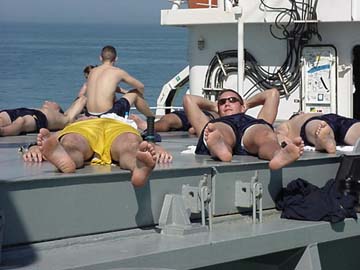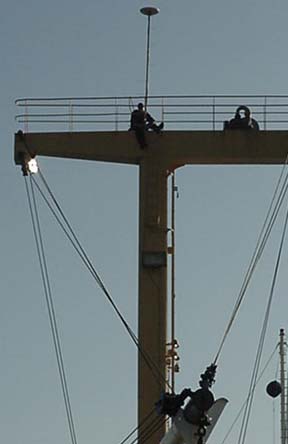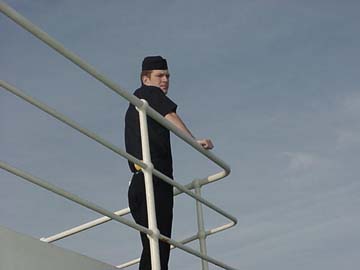
| January 2002 | ||||||
| Sun | Mon | Tue | Wed | Thu | Fri | Sat |
| 1 | 2 | 3 | 4 | 5 | ||
| 6 | 7 | 8 | 9 | 10 | 11 | 12 |
| 13 | 14 | 15 | 16 | 17 | 18 | 19 |
| 20 | 21 | 22 | 23 | 24 | 25 | 26 |
| 27 | 28 | 29 | 30 | 31 | ||
Wednesday 30 January 2002
At 1200, EST the Training Ship Empire State was located 160 nautical miles north of Punta Boxohuo, Mexico, at 23 degrees and 08 minutes North Latitude and 092 degrees 50 minutes West Longitude, steering course 050 degrees true at a speed of 09 knots. The weather was excellent; skies were clear, winds from the northeast at 15 to 20 knots, air temperature was 81 degrees Fahrenheit, barometric pressure was 1014 millibars, seas were from the northeast at 4 to 6 feet, sea injection temperature was 76 degrees Fahrenheit. Depth of water beneath the keel was 2013 fathoms.
CAPTAIN'S LOG
"Do not confine your children to your own learning, for they were born in another time." Hebrew proverb
We are sailing through an interesting part of the Gulf today, northwest of the Yucatan Peninsula. The Peninsula juts out into the Gulf of Mexico and separates it from Caribbean Sea to the southeast. Mexico and the Yucatan, as outlined on the navigation charts, remind me of a much larger version of ole' Cape Cod. Yucatan's submerged landmass continues well north into the Gulf and depths rise abruptly from more than 2000 fathoms to the surface in the blink of an inattentive eye. To the north, the Campeche Bank, like all of the Yucatan's coastal waters, is dotted with small islands, reefs, and shoals.
The Yucatan economy is dependant on what is now called ecotourism. People come in large numbers to visit the ancient Mayan (not Incan) ruins including such well-known sites as Chicen Itza, Uxmal, and Tulum, to experience the splendid tropical rain forests, and to dive in aqua marine luxury. Anyone who lives in the forbidding northern climes has seen captivating commercials showing beautiful people (computer generated no doubt) snorkeling in the crystal blue waters off Cozumel or sipping adult beverages sea side, while lounging in king size, shaded hammocks. The climate isn't as nice as depicted in the overstated advertisements, but both hot and dry and hot and humid are appealing when one is dealing with both cold and colder.
The practical aspects of operating a ship in these waters are obvious. Once again, the age-old nemeses of all seafarers, air - water - dirt interfaces, abound. Vigilance and meticulous voyage planning are the only weapons against it. The cadets are well attuned to the hazards and show due diligence to all subjects navigational. Electronic tools, such as GPS and radar, are preferred but the prudent navigator verifies the accuracy of these modern tools with simple methods tried and true for centuries. Nothing says relief like a first-rate, visual fix and the Cadet Watch Offices are quick to seize the opportunity. Celestial navigation is a big part of the Coast Guard examinations and the validity of morning stars can be quickly verified in this arena.
Navigating here is also enormously enthralling to those without deck officer ambitions. The marine safety, engineers, and international business cadets all see the islands and the Gulf differently. The "crunchies" see analysis of run off and the preservations of life forms as key; the "imbers" are closely aligned with monetary promises subtly depicted in the Cozumel advertisements, and the engineers, well, they see themselves occupying those hammocks and sipping cold drinks courtesy of the house, while indigenous parrots perch regally upon their shoulders. Engineers have always been known as dreamers.


Nearly everyone aboard is interested in the Superbowl and we are trying to make it happen. Our agent in the Caymans is researching reception capabilities and cadets are polishing every television aboard. They are also working extra hard to guarantee that all mandatory academic requirements are up to speed. None want to be trapped in the hold catching up or re-doing an assignment during the game. I cannot see that happening, not with three whole days until the kickoff. If something prevents us from receiving the game, I will quit, become an author, and get rich from my first book, the Grand Cayman Superbowl Mutiny.

In the mean time, returning to sea renews the seafaring spirit or stirs it for the first time in many. Despite the demands, cadets seem to find ample time for personal reflection. The ages old solidarity that we have with the sea is never more apparent than when watching the reactions of young people, new to it. The open sea kindles the romantic; some inexplicable, intrinsic quality lures it out. I believe that it may be the light- the blush of dusk and of the coming dawn. Sea birds rest, and even the winds lay down at these times; all creatures seem changed. The resplendent natural beauty, understated and unspoiled by architecture or the off gasses of progress, quietly draws them, like moths to flame.

There at the rail they stand, just as Columbus, Cortes, and Drake of ages past, young cadets, brushed by the warm radiance of the coming evening, reinventing the world. Would you spare a penny for their thoughts? They think differently...they were born in another time.
See You tomorrow... from somewhere west of Cuba
QUESTIONS FOR THURSDAY 31 JANUARY
MATH: Cadet Scharf measured the distance around the circumference of a barrel. That measurement was 44 inches. Cadet Pinkerton needed to know the diameter. What is the diameter?
SCIENCE: What atmospheric disturbance does differences in air pressure and unequal heating in the atmosphere cause?
GEOGRAPHY: Ships traveling from east to west or west to east must take into account changes in time because of the time zones that they travel through. If the Empire State travels from Fort Lauderdale, U.S.A., to Vera Cruz, Mexico how many time zones must it adjust for? What will the adjustment be? Name each time zone.
HISTORY: The Mexican forces during the Mexican American War were lead by a general who has left a lasting legacy of interest in U.S. - American relations. What was the Mexican general's name? And, speaking of legacies, what unusual fact about this general can you find?
ANSWERS FOR WEDNESDAY 30 JANUARY
MATH: $480.70 + $200.00 = $680.70
$23.80 + $65.00 + $165.00 = 253.80
$680.70 - $253.80 = $426.90
SCIENCE: Precipitation can fall as rain, snow, hail, or sleet
GEOGRAPHY: Shrimp
HISTORY: Texas was once known as the Lone Star Republic or the Republic of Texas (1836-1845).